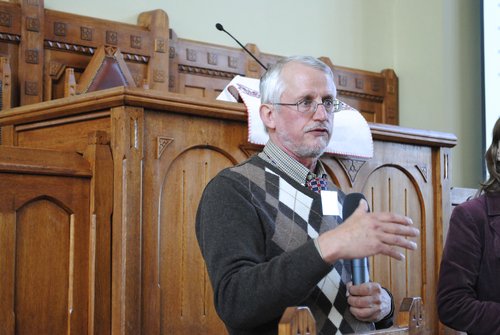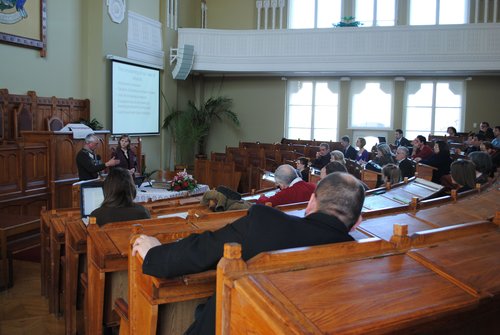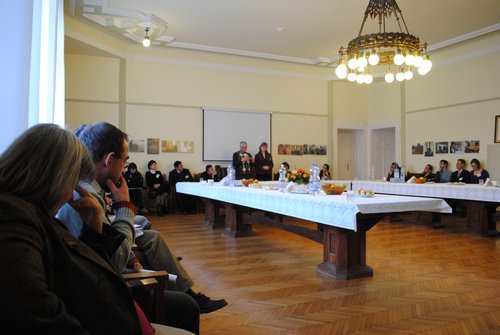Redefining Mission
2013. február 28., csütörtökThe Dutch Reformed Church in South Africa and the Reformed Church in Hungary signed a partnership agreement in 2011 to symbolize the churches' commitment to share and learn with one another as sister churches. Dr. Attie van Niekerk, founding member and managing director of the NOVA Institute as well as a theological professor at the University of Pretoria, recently represented the DRC in Budapest with a series of lectures on poverty and the redefinition of mission and held meetings with the RCH's Roma Ministry, Diaconia, Eco-Congregation as well as László Gonda, missiology professor.
First, how did your interest start in this whole topic – mission and this specific look on poverty around the world?
I remember when I was a student during my theological studies. I began to realize that the kingdom of God includes the whole of life, the whole of reality. And that the church is the witness to the kingdom but the kingdom is much greater than the church. It is God's reign over history – that God is working in world history, not only in the church as a spiritual entity. I think that realization was very important, and then I was always confronted with people who are really in need. I always felt that you cannot see the need of people and ignore it. In South Africa it had to do with apartheid. I had friends who were students, theological students, black friends, in Pretoria. We started to become aware that poverty, injustice, inequality are a result of our human actions, and inequality is something that requires us to do something. It's not a given. You begin to feel responsible for the way people suffer. You feel that you have to respond to it.
I did my doctoral thesis on four poets in Soweto and Alexandra, near Soweto, and that opened my eyes to a lot of things. I realized that it is not only a political problem, but it's much more than that. They wrote a lot about western culture and competition and individualism and the lack of community and this search for unity – not to just be an individualist competing with others, but to belong to a community, even a longing for unity with mother earth. I started to realize the whole western culture, and all the things we do are alien to the African tradition. And even the good things we think we're doing may have a destructive effect on the traditional identity. So suffering became more than only economical and political or poverty. I started to see this as a deeper problem than a political and economic problem, but it had to do with deeper values – our relationship to the world. The phrase that was used quite often then was, 'a place to be at home.' Western culture alienates you from yourself. So, for me this is something the church could attend to. The church can help people find a place to be at home. I don't know if you know Peter Berger, he's an American sociologist. He wrote the book 'The Homeless Mind' and in this he said that it's not only in Africa, but worldwide that modernization produces this homeless mind. So I think that was the way in which eventually we said, 'OK, let us work on this problem of poverty.'

How did you get involved with NOVA and can you give a description of NOVA's mission?
In the first congregation I was in, I realized two or three things. One is, in the African concept, the family and the home are the center of life. People will go to work on the farms. You have interviews with the women who work on the farms in the sun, and you ask them, 'Why do you work here?' And they say two things, 'I want to improve my house' or 'I want to help my children to study.' So they don't work to buy clothes or to buy a car or to travel. They work to improve their homes. In the African context, there's no institution who cares for orphans or for old people or for handicapped people – all the people in need. It's only the family that takes care [of them]. I started to think about the importance of the family and the household.
The other thing I saw was that the development projects being undertaken in the rural area. They were based on the experience of the decision makers – the government officials. They had an idea of this is what must be done and that idea was never tested in the community. So the way people interpret the services and development preference was completely different from the way it was intended. For example, there was a local brick maker. He had an old truck. He made bricks and he sold them. The development corporation came to him and said, 'Look, we'll help you to go big.' And they worked out a business plan. They gave him a loan. And he suddenly had the big trucks but he could not manage all of that. He could not repay his loan and they came back and took everything. And he was broke, but the people said, 'Yes, that's the apartheid government now.' Whenever there's a penned up business they come and destroy it. So the interpretation of the community was that it was on purpose. The officials meant well, but they didn't understand the situation there. What they did in the end did more harm than good.
There are many examples. I came to the conclusion that there is a big gap between what the decision makers think and what the community understands. I think that went through with the development page as all those billions of dollars. The intention of NOVA was to really sit down with people, to take enough time to realize what is going on there. Do nothing before you understand. We would talk to people and always go back and say, 'Let me hear you correctly' until they say, 'OK, now that is correct.' [It is] the same with what should we do about it. We really try to do our best to not use things that people in the community don't agree with. The first things they say will not be right. If they think about it, they also come to this. It's a long process to come to the right [decision], and that is what we think is important.
What do you see as the connections between the countries? Why is your experience in South Africa relevant here?
I think it's the fact that we both came out of a situation where the policy of our government has been discredited, on both sides. There is a difference; in our situation the church was a part of the system at least for a long time. But here, it seems you have the same thing. You had people who participated and people who resisted the political dispensation, and now you have to deal with the past. I think we both have that experience of political situations that we have to deal with. Our role in the political situation we have to deal with.
It seems to me Hungary was not completely isolated, we also were not completely isolated, but [at the same time] we were isolated. We were always unwelcome. We always had to explain ourselves, even when I was in Holland in '81. At this point I was strongly convinced that apartheid was wrong, but in Holland, people will attack you like you're a part of it. It's uncomfortable, because they also simplify it, and you explain that it's not as simple as [they] think. Then you feel you're starting to defend something. So, I think that feeling of isolation [Hungarians] also had. Now that the world has opened up and we are welcome, we have to build networks and discover our place. I think that is a similar experience. We are closer together as far as experience than Western European churches and so on. They have already worked through some of the problems we haven't.
Clearly, poverty here is different than poverty in South Africa. It's on a completely different scale, even if the basics are the same. How do you deal with those differences? The things that are working in South Africa would not translate to Hungary. So how do you get over that?
That is part of the discussion today. I think we have not yet found the common issues to deal with. It will take more discussion to determine 'OK, this is what we have in common'...I don't know. That's something I'm wondering about. I hoped today that there would be some more common ground, but I didn't see much. [Maybe this is the discovery period for Hungary]. I think yesterday's discussion with László Gonda, missiology professor, was interesting. He officially has to develop a strategy for sub-Saharan Africa and he recognizes the role of the church. It seems that Hungary is a bit of an exception in the European Union that they emphasize the importance of family, which is what we work on. László seemed interested to follow up. What will become of this, I don't know. As we talk, I'm sure we'll find it, because there must be common issues, which we can deal with.

Regarding the agreement, how do you see the future going? How can the Hungarian church help you and how can the South African church help here in Hungary?
I think it's also part of the discovery period. Our situation is very different. I think that it's more the affinity we feel between our churches that is important. For Hungary, the Hungarian church wants to expand its network and we also want to do that. I think it's an agreement between the leaders. The agreement is the same feeling I had, that we understand each other maybe we should do something together. What it is, we still have to discover.
What do you hope the people come away with from your lecture, either at the theological school or today at the Synod? What overall message?
One thing that I would like to have conveyed – that broadening scope of mission does not mean that we devalue our personal relationship to God, Christ, but that it cannot limit the biblical message. That is the one thing. The other is that we must not underestimate the issues that we have to deal with. They are complex and they need good research, good management, good planning. You can say with diaconal work we have to move from being amateurs to professionals.
You talked throughout the lecture about the importance of the church working with other organizations. Why do you feel that the church is such and important part or the most important part of this mission in the world?
The problems of poverty and affluence are deeply spiritual problems. If we try to solve them by giving attention to the deepest sense of what motivates us as human beings, we'll fail. Politics cannot solve it. It doesn't matter how wonderful the political solution for South Africa was. After 20 and 40 years, it just integrates if you don't have that spiritual core and discipline and healthy source of values. That is for me important in a pragmatic way. We are servants of the word of God. We don't have our own message to spread. I feel that it remains my task to be a witness to the biblical message. So it's both things, it's what I believe, but it also works.
How do you envision getting churches involved in this redefinition of mission and the way mission works?
I think it starts slowly. In my own limited experience, we started to work on the periphery of the church. [Our moderator] is very focused on the way the church should change and redefine it's role. He works with this attractional versus missional [theory]. Not only to ask people to come to the church but to go out into the community to see what is going on out there. I think there's a movement in that direction. So, I see it as something the church has to start with a few congregations and it should gain momentum.

What are your impressions so far in Hungary regarding the different ministries of the church: Roma, Eco-congregation and Diaconia? What their mission is and how they connect or differ?
What I saw and what I heard about the Roma people is very similar to what we call chronic poverty. It's a cultural poverty. It's from one generation to the next and it's a way of living. I think it's clear to me that the Hungarian church doesn't really know what to do with it. Some withdraw and others want to get involved. We have the same in South Africa. We deal with problems that we cannot solve, problems that are too big for us.
If the problem is too big, what's the starting point and what's the motivation if it's not solving anything?
I think it is that we are a witness to the coming of the kingdom, but it is God's kingdom. So I think in every situation we have to understand the presence of God in the culture of poverty, even if that culture does not change and people become ruthless. God is present there in a way that we have to learn to understand. I think a big difference is that is South Africa it's a very rough situation. It's violent – poverty is rough – it's huge. You see millions of people who are poor. In Hungary you don't have that context.
Throughout your lecture, you reference an "ethical quality of life." How would you define an ethical quality of life?
I think what came first is the idea that this quality of life was an effort to get a direction on consumerism. Quality of life is not necessarily the more affluent you are you have a better quality of life. You can have a good quality of life without being affluent. Adding ethical to quality of life means that we do not only measure quality of life in terms of desires, but in terms of values, which is a shift of meaning.
How would you describe the discrimination you've heard about in Hungary and having been through apartheid how do you suggest breaking down these walls and barriers that are built up between these two communities?
Well, maybe I should say that we cannot really present ourselves as a good example. We had a political solution, but it's still the same problem you see here, which is that people try to remove themselves from those people they don't like to relate to. On the one hand, many things have changed. In the job situation, and in the universities..But, you also have this element of not willing to relate. With us...The people who were convinced that apartheid was wrong persevered in working locally on a small scale wherever they were. They did not give up on promoting or witnessing to what was right. That certainly prepared the ground. So I would say somebody like Eszter [Dani, head of the RCH Mission department], she should continue. She must not give up.
We always said our situation is the meeting of an unstoppable force with an immoveable object. We may have been in the situation of Syria today. We really thought it was not possible for us to switch over to say, 'OK, let us work together.' You could not talk logically. Everything was a conflict. For somebody to come in both sides and pacify it and say, 'OK, let us drop all this distrust' – Distrust was the biggest thing – and say, 'Let us work together.' This spirit of change, I didn't think it was possible. And I saw it happen. So it made me believe that change is possible.
Amy Lester
Contact us
Click here if you are interested in twinning.
Reformed Church in Hungary
Address: H-1146 Budapest, Abonyi utca 21.
PO Box: 1140 Budapest 70, Pf. 5
Email: oikumene@reformatus.hu
English, German and Korean language services in Budapest
Links
Recommended articles
-
Pastoral Letter in the Light of the Pandemic
Bishop Dr. István Szabó sent a pastoral letter of encouragement to the ministers serving in RCH’s congregations, expressing his gratitude for the persistence and creativity of the pastors.
-
RCH Joins in Pope's Call for Prayer
RCH published the call on congregations to join the initiative of Pope Francis, supported by ecumenical organisations, to unite in praying the Lord’s Prayer on Wednesday, 25 March, at noon.
-
English Speaking Worship Services Online
Each Sunday at 11 AM (CET) the St. Columba's Church of Scotland in Budapest, the international community of RCH invites you to join the worpship service on its facebook page.
-
Test of Humanity and Companionship
Reformatus.hu asked Dr. György Velkey, Director General of the Bethesda Children’s Hospital of RCH about the challenges of health care workers and ways of prevention against the pandemic.
-
All Church Events Suspended
In light of the coronavirus the Presidium of RCH requested congregations to suspend all church events with immediate effect. Beside restrictions, it calls for prayer, sobriety and responsibility.











